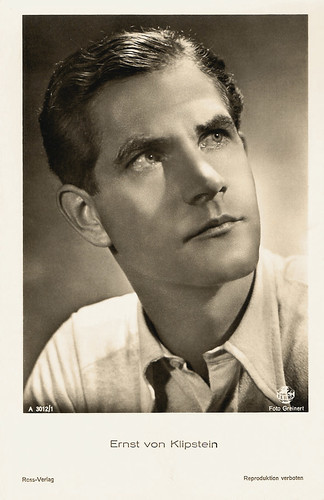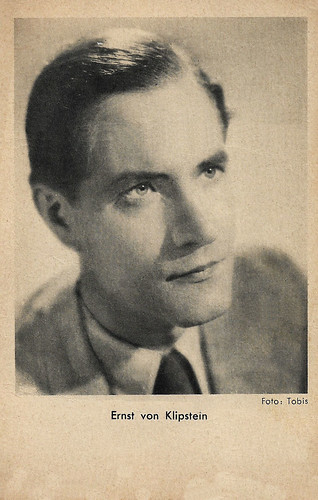
German postcard by Ross Verlag, no. A 3012/1, 1941-1944. Photo: Greinert / Terra.

German postcard by Film-Foto-Verlag, no. A 3567/1, 1941-1944. Photo: Baumann / Ufa.

German postcard by Film-Foto-Verlag, no. K 1426. Photo: Baumann.
The ideal country junker and Prussian officer
Ernst Vollrath von Klipstein was born in 1908 in Posen, Prussia in the German Empire (now Poznan, Wielkopolskie, Poland). He first studied law and theatre studies for six semesters. At the same time, he took acting lessons with Jacobi in Munich.
In 1925 he made his stage debut as Leon in Franz Grillparzer's 'Weh dem, der lügt' at the Landestheater Darmstadt. This was followed by theatres in Regensburg, Meiningen, Bochum, Cologne, Kassel, Frankfurt am Main and Leipzig. He played, among others, Don Carlos, Max Piccolomini in Friedrich Schiller's 'Wallenstein', Cardinal Julian in Franz Werfel's 'Das Reich Gottes in Böhmen'(both in Bochum), Ferdinand in Schiller's 'Kabale und Liebe' (Intrigue and Love, in Frankfurt) and Marchbanks in George Bernard Shaw's 'Candida' (in Kassel).
At the end of 1938 Ernst von Klipstein made his feature film debut in Gustav Ucicky's Aufruhr in Damaskus/Riot in Damascus. Until the end of the war, he played mostly striking supporting roles in numerous Ufa productions, which came close to the ideal of the country junker and the Prussian officer of the time.
He played under the direction of Viktor Tourjansky in Der Gouverneur/The Governor (1939) and under the direction of Boleslaw Barlog in Unser kleiner Junge/Our Little Boy (1941). Alongside Heinrich George and Ilse Werner, he appeared in the historical comedy Hochzeit auf Bärenhof/Wedding in Barenhof (Carl Froelich, 1942) after Hermann Sudermann.
He co-starred with Hans Söhnker and Anneliese Uhlig in the Propaganda film Blutsbrüderschaft/Blood Brotherhood (Philipp Lothar Mayring, 1941) as well as in two tendentious Nazi propaganda films by Karl Ritter, Stukas (1941) with Carl Raddatz and Besatzung Dora/Occupation Dora (1943), starring Hannes Stelzer. Von Klipstein was on the 'Gottbegnadete' list of the Reich Ministry for Popular Enlightenment and Propaganda in 1944.

German postcard by Ross Verlag, no. A 2863/1, 1939-1940. Photo: Tobis.

German postcard by Ross Verlag, no. A 3228/2, 1941-1944. Photo: Baumann / Terra.

German postcard by Film-Foto-Verlag, no. A 3958/2, 1941-1944. Photo: Baumann.

German postcard by Film-Foto-Verlag, no. G 132. Photo: Baumann / Ufa.
The theatre was the hub of his activity after the war
After the 1940s, Ernst von Klipstein only appeared in a few film productions. The theatre formed the hub of his activity after the war for the time being.
His rare appearances in post-war cinema include Skandal um Dr. Vlimmen/Dr. Vlimmen (Arthur Maria Rabenalt, 1956) starring Bernhard Wicki, the historical drama Die Barrings/The Barrings (Rolf Thiele, 1955) with Dieter Borsche and Nadja Tiller, the war drama Hunde, wollt ihr ewig leben/Stalingrad: Dogs, Do You Want to Live Forever? (Frank Wisbar, 1959) and the Johannes Mario Simmel adaptation Der Stoff aus dem die Träume sind/The Stuff That Dreams Are Made Of (Alfred Vohrer, 1972, starring Hannelore Elsner.
Instead, he increasingly took part in lavish television productions such as the miniseries Bauern, Bonzen und Bomben/Farmers, Politics and Bombs (Egon Monk, 1973) an adaptation of Hans Fallada's novel, the historical series Der Winter, der ein Sommer war/The winter that was a summer (Fritz Umgelter, 1976) after the novel of the same name by Sandra Paretti, the family saga Die Pawlaks/The Pawlaks (Wolfgang Staudte, 1982) and the series Nirgendwo ist Poenichen/Nowhere is Poenichen (1980) after the bestseller by Christine Brückner.
He also acted as Grandfather de Bonsac in the acclaimed series Tadellöser & Wolff (Eberhard Fechner, 1975), based on the novels by Walter Kempowski. Von Klipstein also took on numerous guest roles in television series and serials such as Tatort, Sonderdezernat K1, Der Landarzt, Großstadtrevier, Die fünfte Kolonne, Percy Stuart and Die Schwarzwaldklinik. He also worked extensively as a voice actor for German versions of international films between 1949 and 1991. He lent his distinctive voice to Gary Cooper in Along Came Jones (Stuart Heisler, 1945), Rex Harrison in The Rake’s Progress (Sidney Gilliat, 1945), Michael Redgrave in The Importance of Being Earnest (Anthony Asquith, 1952), and among others. Von Klipstein was also often engaged as a radio play narrator.
Ernst von Klipstein was married four times, with Deli Maria Teichen, actress Lotte Koch, Elisabeth Biebl and finally with the actress Marianne Kehlau. He died in Hamburg in 1993 at the age of 85 and was buried at the Waldfriedhof in Hamburg-Volksdorf, as was his second wife Lotte Koch, whose name is not engraved on the gravestone.

German postcard. Photo: Terra / Baumann.

German postcard by Ross Verlag for Das Programm von Heute, Berlin. Photo: Baumann / Terra.

German postcard by Ross Verlag for Das Programm von Heute, Berlin. Photo: Tobis.

German postcard by Ross Verlag for Das Programm von Heute, Berlin. Photo: Terra / Baumann.

German postcard by Ross Verlag for Das Programm von Heute, Berlin. Photo: Ufa / Baumann.
Sources: Wikipedia (German and English) and IMDb.
No comments:
Post a Comment